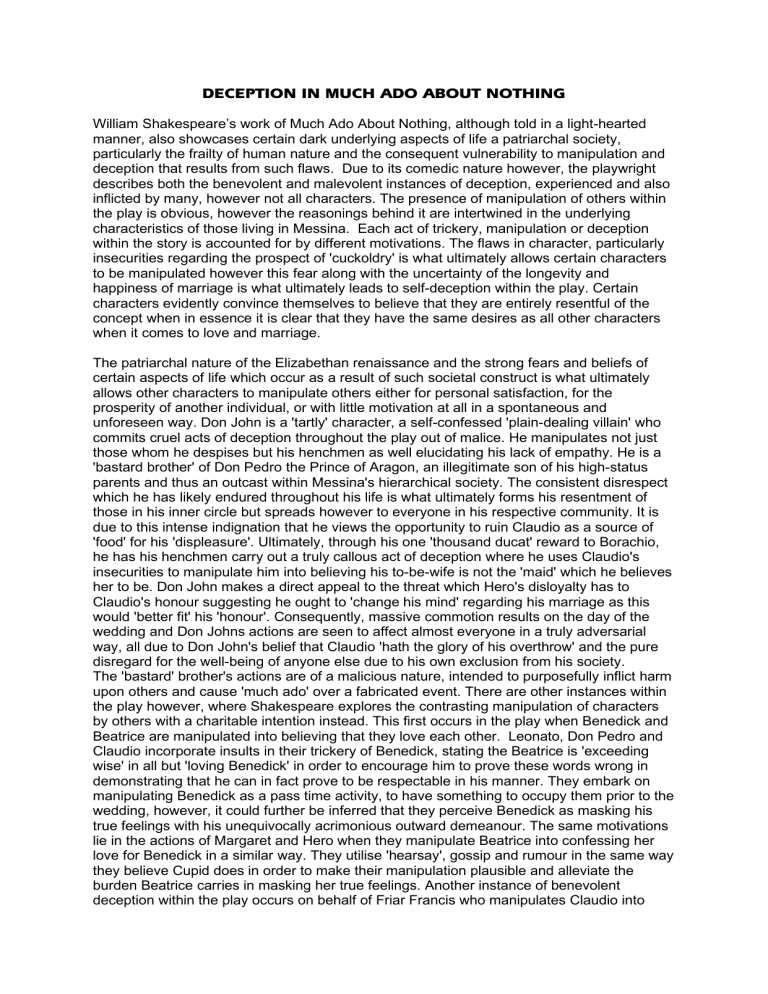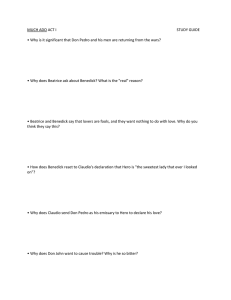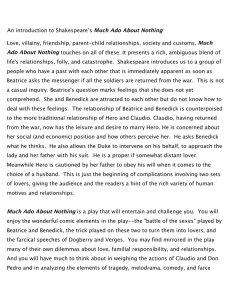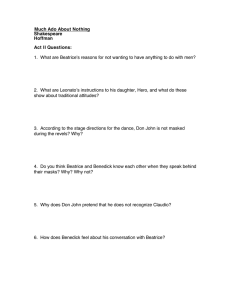
DECEPTION IN MUCH ADO ABOUT NOTHING William Shakespeare’s work of Much Ado About Nothing, although told in a light-hearted manner, also showcases certain dark underlying aspects of life a patriarchal society, particularly the frailty of human nature and the consequent vulnerability to manipulation and deception that results from such flaws. Due to its comedic nature however, the playwright describes both the benevolent and malevolent instances of deception, experienced and also inflicted by many, however not all characters. The presence of manipulation of others within the play is obvious, however the reasonings behind it are intertwined in the underlying characteristics of those living in Messina. Each act of trickery, manipulation or deception within the story is accounted for by different motivations. The flaws in character, particularly insecurities regarding the prospect of 'cuckoldry' is what ultimately allows certain characters to be manipulated however this fear along with the uncertainty of the longevity and happiness of marriage is what ultimately leads to self-deception within the play. Certain characters evidently convince themselves to believe that they are entirely resentful of the concept when in essence it is clear that they have the same desires as all other characters when it comes to love and marriage. The patriarchal nature of the Elizabethan renaissance and the strong fears and beliefs of certain aspects of life which occur as a result of such societal construct is what ultimately allows other characters to manipulate others either for personal satisfaction, for the prosperity of another individual, or with little motivation at all in a spontaneous and unforeseen way. Don John is a 'tartly' character, a self-confessed 'plain-dealing villain' who commits cruel acts of deception throughout the play out of malice. He manipulates not just those whom he despises but his henchmen as well elucidating his lack of empathy. He is a 'bastard brother' of Don Pedro the Prince of Aragon, an illegitimate son of his high-status parents and thus an outcast within Messina's hierarchical society. The consistent disrespect which he has likely endured throughout his life is what ultimately forms his resentment of those in his inner circle but spreads however to everyone in his respective community. It is due to this intense indignation that he views the opportunity to ruin Claudio as a source of 'food' for his 'displeasure'. Ultimately, through his one 'thousand ducat' reward to Borachio, he has his henchmen carry out a truly callous act of deception where he uses Claudio's insecurities to manipulate him into believing his to-be-wife is not the 'maid' which he believes her to be. Don John makes a direct appeal to the threat which Hero's disloyalty has to Claudio's honour suggesting he ought to 'change his mind' regarding his marriage as this would 'better fit' his 'honour'. Consequently, massive commotion results on the day of the wedding and Don Johns actions are seen to affect almost everyone in a truly adversarial way, all due to Don John's belief that Claudio 'hath the glory of his overthrow' and the pure disregard for the well-being of anyone else due to his own exclusion from his society. The 'bastard' brother's actions are of a malicious nature, intended to purposefully inflict harm upon others and cause 'much ado' over a fabricated event. There are other instances within the play however, where Shakespeare explores the contrasting manipulation of characters by others with a charitable intention instead. This first occurs in the play when Benedick and Beatrice are manipulated into believing that they love each other. Leonato, Don Pedro and Claudio incorporate insults in their trickery of Benedick, stating the Beatrice is 'exceeding wise' in all but 'loving Benedick' in order to encourage him to prove these words wrong in demonstrating that he can in fact prove to be respectable in his manner. They embark on manipulating Benedick as a pass time activity, to have something to occupy them prior to the wedding, however, it could further be inferred that they perceive Benedick as masking his true feelings with his unequivocally acrimonious outward demeanour. The same motivations lie in the actions of Margaret and Hero when they manipulate Beatrice into confessing her love for Benedick in a similar way. They utilise 'hearsay', gossip and rumour in the same way they believe Cupid does in order to make their manipulation plausible and alleviate the burden Beatrice carries in masking her true feelings. Another instance of benevolent deception within the play occurs on behalf of Friar Francis who manipulates Claudio into acting in a respectful manner towards Hero. His comment that ‘if ever love had interest in his liver’ he would wish that ‘he had not so accused her’ makes an appeal to Claudio’s morals which truly he is lacking and encourages him to behave in a more respectful manner towards Hero, writing her a poem and attending her funeral. These benevolent motivations in using an ethically questionable method to trick two people into believing a half-truth ultimately result in a fruitful outcome for both juxtaposing the malevolently motivated actions of Don John which resulted in nothing but havoc and anguish. Shakespeare also incorporates within his work an unexpected and accidental manipulation on behalf of the fools of the play who through their desire to be noted and respected by society unintentionally capture the two main villains who have carried out the main act of deception within the play. Upon their confession Dogberry, not yet comprehending what he has just achieved merely specifies that he is termed an 'ass' by Claudio and Don Pedro, an insult which Conrad utilised earlier, yet Dogberry desires to have a title, simply because it is a title, even if it has a negative connotation which he doesn't quite grasp. Thus, the multiple instances of manipulation in the play all differ in their nature due to the differing motivations which their instigators have for their actions. Perhaps the more important aspect of deception in Much Ado About Nothing is the character-flaws which allow certain individuals to be tricked, used and manipulated. Shakespeare explores this most prevalently through Claudio, whom he portrays as shallow and having superficial expectations and desires. He looks on Hero with more than 'a soldier’s eye' as he did prior, because he is aware that a marriage is what is expected of him in society and this becomes more apparent throughout the play. Firstly, Shakespeare highlights the surface-level nature of Hero and Claudio's 'love' in the first instance of malevolent deception by Don John where he convinces Claudio that Don Pedro has in fact wooed Hero for himself. Claudio immediately believes that Don Pedro has betrayed him yet directs his anger at Hero saying that 'beauty is a witch', highlighting the fact that he is attracted to Hero merely for her 'fairness', her outward appearance which is an extremely superficial outlook created by the respective patriarchy which he is a part of. Furthermore, once he is tricked into believing that Hero has been unfaithful, he is met with the question of 'wedding her' if he truly 'loves her' provided by Don John, instead he elects to publicly disgrace her on her wedding day and waits purposefully until that day to slander her. He never considers any other possibly version of events especially Hero's, through having Claudio act in such a callous and impulsive manner towards a person whom he apparently loves, Shakespeare aims to elucidate the superficial motivations which Claudio through the fact that he does not truly 'love' his fiancée but rather views her as having the potential to provide him with a satisfactory marriage seeing as she has all the requirements society has deemed necessary for a woman to have. He acts out of his fear for his honour being besmirched, staining instead the honour of Hero. His actions are almost equivalent in malice to that of Don John, completely inconsiderate and blatantly disrespectful and ill-thought out, all due to his infatuating with up keeping his honourable place within his society. Thus, through his description of Claudio's shallow manner and actions Shakespeare highlights the frailty of those who are fully accepting of their role within society and thus place their reputation above all else demonstrating disregard for all others in doing so. Shakespeare the dark character flaws which allow others to be deceived and to act impulsively and disgracefully upon such deception however he also explores a differing nature of deception one in which an individual deceived themselves in order to preserve their independence and free will, which they believe to be threatened by the prospect of love and marriage. Both Benedick and Beatrice are known for their 'merry-war', embellished by their wit and assertiveness. They often throw harsh insults at each other, particularly Beatrice who is shown to attack every aspect of Benedick's persona. She calls him greedy when she mentions he 'hath an excellent stomach', incompetent when she claims, 'four of his five wits went halting off' and disloyal when she says 'he hath every month a new sworn brother'. In response, Benedick comments on the disparaging nature of her insults, demeaning her way of conversing saying she speaks 'poniards' and advises her to 'keep [her] ladyship still in that mind' so that others may avoid a 'scratched face' equating her ruthless 'tongue' to that of physical assault. Both characters are furthermore portrayed to explicitly express their resentment towards the entire concept of love and marriage. Beatrice desires to be greeted by St Peter upon her arrival in heaven and directed to the play 'where the bachelors sit', she is only accepting of any relations with the opposite sex in passing where societal norms and expectations no longer have a role or impact in her life. She believes that marriage for women means submitting to the rule of a man, most evident when he questions 'would it not grieve a woman to be overmasted with a piece of valiant dust?". To her marriage is like a 'cinquepace', Shakespeare utilises an extended simile to have her describe the nature of marriage from her point of view. Once tensions begin to form between the married couple growing faster and faster until both 'sink into' their 'graves', she views the institution as a chaotic means of damning a woman's liberty and free will. Benedick also despises the concept of marriage, due to his intense fear of becoming a 'cuckold' a victim of his wife's infidelity. He evidently expresses his resentment in his questioning of Claudio's decision to marry as to him marriage is akin to 'thrusting' ones 'neck into a yoke' and sighing away Sundays', he believes that the institution of marriage is essentially a prison for a man similarly to Beatrice's and a means for him to lose his reputation and place in society. Shakespeare purposefully has the feuding pair abhor these concepts; it is done in a way to mask their true feelings for one another. Benedick is so passionate about wanting nothing to do with Beatrice that is can in fact be inferred that he does in fact think of her in that way and perhaps deep-down desires her hand in marriage. Shakespeare illustrates this concept when Benedick unequivocally claims that he would not marry Beatrice even if she were 'endowed with all that Adam had left him before he transgressed'. The same can be inferred from Beatrice's words when she says 'Good Lord for alliance' mimicking Benedick's concern that he will never again see a 'bachelor of three-score' indicating that both characters are in fact sensitive to the fact that everyone is getting married but them. Hence why they are able to be tricked so easily by their friends into believing that they are loved by the other because deep down both long for the same outcome in marriage and the security which it provides in a patriarchal society as does everyone else. Thus, Shakespeare also includes the concept of self-deception throughout his writing. Thus, Shakespeare through within his work of Much Ado About Nothing explores the different aspects of the infliction of deception upon others. The way in which it is used to create scandal and tragedy as well as the way in which it is utilised to create good. The accidental and unintentional acts of manipulation which bring about justice as-well as the self-deception elicited by certain characters to avoid facing the things which they truly fear. Manipulation is woven throughout the entire play and William Shakespeare does so in order to elucidate both the downfalls and complementary virtues of all individuals as well as the impact which a patriarchal society can have on one’s desires and consequent fears.



